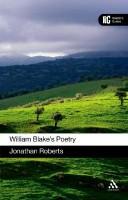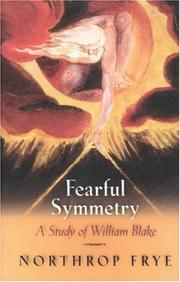| Listing 1 - 10 of 51 | << page >> |
Sort by
|
Book
ISBN: 0300025505 Year: 1981 Publisher: New Haven, Conn. Yale University Press
Abstract | Keywords | Export | Availability | Bookmark
 Loading...
Loading...Choose an application
- Reference Manager
- EndNote
- RefWorks (Direct export to RefWorks)
Blake, William --- Blake, William, --- Exhibitions. --- Blake, W. --- Bleĭk, Uilʹi︠a︡m, --- בליק, ויליאם, --- בלייק, ויליאם, --- Blake, William, 1757-1827

ISBN: 1474211593 1283123053 9786613123053 1441182276 9781441182272 9781283123051 9781441183989 1441183981 9781474211598 6613123056 9780826488596 0826488595 9780826488602 0826488609 Year: 2007 Publisher: London New York Continuum
Abstract | Keywords | Export | Availability | Bookmark
 Loading...
Loading...Choose an application
- Reference Manager
- EndNote
- RefWorks (Direct export to RefWorks)
Reader's Guides provide a comprehensive starting point for any advanced student, giving an overview of the context, criticism and influence of key works. Each guide also offers students fresh critical insights and provides a practical introduction to close reading and to analysing literary language and form. They provide up-to-date, authoritative but accessible guides to the most commonly studied classic texts. William Blake is a Romantic poet who remains popular today, in part because his exceptional insight into psychological, political and social issues remains powerfully relevant. The Reader's Guide begins by introducing Blake's major themes including religious, political and social issues and then moves on to reading key works, including Songs of Innocence and Experience and The Marriage of Heaven and Hell. It offers an invaluable introduction to reading Blake's poetry and includes sections on its contexts, language and style, critical reception and adaptation and influence and finally an annotated guide to further reading.
Blake, William, --- Blake, W. --- Blake, William --- Blake, William, 1757-1827 --- Bleĭk, Uilʹi︠a︡m, --- בליק, ויליאם, --- בלייק, ויליאם, --- Criticism and interpretation.
Book
ISBN: 0203078063 0415656184 9780203078068 9780415656184 9781135135768 9781135135713 9781135135751 9781138858527 1138858528 1135135762 128394197X 1135135754 Year: 2013 Publisher: New York Routledge
Abstract | Keywords | Export | Availability | Bookmark
 Loading...
Loading...Choose an application
- Reference Manager
- EndNote
- RefWorks (Direct export to RefWorks)
Blake, William, --- Blake, W. --- Blake, William --- Blake, William, 1757-1827 --- Bleĭk, Uilʹi︠a︡m, --- בליק, ויליאם, --- בלייק, ויליאם, --- Criticism and interpretation. --- Influence.
Book
ISBN: 0511709021 1108013678 Year: 2011 Publisher: Cambridge : Cambridge University Press,
Abstract | Keywords | Export | Availability | Bookmark
 Loading...
Loading...Choose an application
- Reference Manager
- EndNote
- RefWorks (Direct export to RefWorks)
Although today William Blake (1757-1827) is recognised as a visionary poet and artist, at the time of his death he was unknown except for his presumed insanity. This highly influential two-volume biography by the barrister Alexander Gilchrist, first published in 1863 and reissued here in its second edition (1880), rescued William Blake from almost complete obscurity. The accepted interpretation of his madness was challenged and his creative talents were brought to the attention of Victorian society by the inclusion of selected writings and artistic works, nearly all previously unpublished. Volume 1 of Gilchrist's book is an account of William Blake's life, combining excerpts from his written works and paintings with detailed biographical information drawn from surviving letters and contemporary accounts.
Poets, English --- Artists --- Blake, William, --- Blake, W. --- Blake, William --- Blake, William, 1757-1827 --- Bleĭk, Uilʹi︠a︡m, --- בליק, ויליאם, --- בלייק, ויליאם,
Book
ISBN: 131623388X 1316235777 113903247X 0521763037 0521128412 Year: 2014 Publisher: Cambridge : Cambridge University Press,
Abstract | Keywords | Export | Availability | Bookmark
 Loading...
Loading...Choose an application
- Reference Manager
- EndNote
- RefWorks (Direct export to RefWorks)
William Blake (1757‒1827) is one of the most original and influential figures of the Romantic Age, known for his work as an artist, poet and printmaker. Grounding his ideas both in close reading and in the latest scholarship, Saree Makdisi offers an exciting and imaginative approach to reading Blake. By exploring some of the most important themes in Blake's work and connecting them to particular plates from Songs of Innocence and of Experience, Makdisi highlights Blake's creative power and the important interplay between images and words. There is a consistent emphasis on the relationship between the material nature of Blake's illuminated books, including the method he used to produce them, and the interpretive readings of the texts themselves. Makdisi argues that the material and formal openness of Blake's work can be seen as the very basis for learning to read in the spirit of Blake.
Blake, William, --- Blake, W. --- Blake, William --- Blake, William, 1757-1827 --- Bleĭk, Uilʹi︠a︡m, --- בליק, ויליאם, --- בלייק, ויליאם, --- Criticism and interpretation.
Book
ISBN: 3030676889 3030676870 Year: 2021 Publisher: Cham, Switzerland : Palgrave Macmillan,
Abstract | Keywords | Export | Availability | Bookmark
 Loading...
Loading...Choose an application
- Reference Manager
- EndNote
- RefWorks (Direct export to RefWorks)
Prophecy in literature. --- Blake, William, --- Criticism and interpretation. --- Blake, W. --- Blake, William --- Blake, William, 1757-1827 --- Bleĭk, Uilʹi︠a︡m, --- בליק, ויליאם, --- בלייק, ויליאם,
Book
ISBN: 0691083827 1306992966 0691611467 0691639469 1400857643 9781400857647 9780691083827 9780691611464 Year: 1985 Publisher: Princeton, N.J. Princeton University Press
Abstract | Keywords | Export | Availability | Bookmark
 Loading...
Loading...Choose an application
- Reference Manager
- EndNote
- RefWorks (Direct export to RefWorks)
This fresh look at the social and political themes of Blake's poetry shows that he was a phenomenologist of liberation," who contested the dominant ideology of his time and who still speaks passionately to our fears and hopes.Originally published in 1985.The Princeton Legacy Library uses the latest print-on-demand technology to again make available previously out-of-print books from the distinguished backlist of Princeton University Press. These editions preserve the original texts of these important books while presenting them in durable paperback and hardcover editions. The goal of the Princeton Legacy Library is to vastly increase access to the rich scholarly heritage found in the thousands of books published by Princeton University Press since its founding in 1905.
Blake, William --- Literature and society --- Social problems in literature. --- History --- Blake, William, --- Political and social views. --- Blake, W. --- Bleĭk, Uilʹi︠a︡m, --- בליק, ויליאם --- בלייק, ויליאם --- בליק, ויליאם, --- בלייק, ויליאם, --- Blake (William). --- Blake, William, 1757-1827 - Political and social views. --- Блейк, Уильям, --- Blake, William, 1757-1827
Book
ISBN: 0691063672 1322886571 069162805X 0691648298 1400869080 9781400869084 9780691628059 Year: 1978 Publisher: Princeton, N.J.
Abstract | Keywords | Export | Availability | Bookmark
 Loading...
Loading...Choose an application
- Reference Manager
- EndNote
- RefWorks (Direct export to RefWorks)
In all of his works Blake struggled with the question of how chaos can be assimilated into imaginative order. Blake's own answer changed in the course of his poetic career. Christine Gallant contends that during the ten year period of composition of Blake's first comprehensive epic, The Four Zoas, Blake's myth expanded from a closed, static system to an open, dynamic process. She further argues that it is only through attention to the changing pattern of Jungian archetypes in the poem that one can discern this profound change. Using the depth psychology of Jung, Professor Gallant presents a comprehensive interpretation of Blake's poetry from his early "Lambeth" prophecies to his mature works, The Four Zoas, Milton, and Jerusalem. She offers a Jungian critical approach that respects the work's autonomy, but still suggests how literature is an ongoing imaginative experience in which archetypal symbols affect their literary contexts. What interests the author is the function that the very process of mythmaking had for Blake. Professor Gallant finds that the metaphysical opposition between God and Satan in Blake's earlier work gradually evolves into an interplay of these powers in the later works. The quality of Chaos changes for Blake from something unknown and feared, contrary to Order, to something intimately known and embraced.Originally published in 1979.The Princeton Legacy Library uses the latest print-on-demand technology to again make available previously out-of-print books from the distinguished backlist of Princeton University Press. These editions preserve the original texts of these important books while presenting them in durable paperback and hardcover editions. The goal of the Princeton Legacy Library is to vastly increase access to the rich scholarly heritage found in the thousands of books published by Princeton University Press since its founding in 1905.
Thematology --- English literature: authors --- Myth in literature --- Mythe dans la littérature --- Blake, William, --- Criticism and interpretation --- Myth in literature. --- Criticism and interpretation. --- Mythe dans la littérature --- Blake, W. --- Bleĭk, Uilʹi︠a︡m, --- בליק, ויליאם --- בלייק, ויליאם --- בליק, ויליאם, --- בלייק, ויליאם, --- Блейк, Уильям, --- Blake, William --- Blake, William, 1757-1827
Book
ISBN: 0691061890 9780691061894 Year: 1970 Publisher: Princeton, N. J.
Abstract | Keywords | Export | Availability | Bookmark
 Loading...
Loading...Choose an application
- Reference Manager
- EndNote
- RefWorks (Direct export to RefWorks)
Blake, William --- Blake, William, --- Criticism and interpretation --- -Criticism and interpretation --- Criticism and interpretation. --- Blake, W. --- Bleĭk, Uilʹi︠a︡m, --- בליק, ויליאם, --- בלייק, ויליאם, --- Blake, William, 1757-1827 --- Blake, William, - 1757-1827 - Criticism and interpretation --- Blake, William, - 1757-1827

ISBN: 0691061653 0691012911 1400847478 1299289177 Year: 1974 Volume: 165 Publisher: Princeton (N.J.): Princeton university press
Abstract | Keywords | Export | Availability | Bookmark
 Loading...
Loading...Choose an application
- Reference Manager
- EndNote
- RefWorks (Direct export to RefWorks)
This brilliant outline of Blake's thought and commentary on his poetry comes on the crest of the current interest in Blake, and carries us further towards an understanding of his work than any previous study. Here is a dear and complete solution to the riddles of the longer poems, the so-called "Prophecies," and a demonstration of Blake's insight that will amaze the modern reader. The first section of the book shows how Blake arrived at a theory of knowledge that was also, for him, a theory of religion, of human life and of art, and how this rigorously defined system of ideas found expression in the complicated but consistent symbolism of his poetry. The second and third parts, after indicating the relation of Blake to English literature and the intellectual atmosphere of his own time, explain the meaning of Blake's poems and the significance of their characters.
Blake, William --- Blake, William, --- Criticism and interpretation. --- -Criticism and interpretation --- Blake, W. --- Bleĭk, Uilʹi︠a︡m, --- בליק, ויליאם, --- בלייק, ויליאם, --- Blake, William, 1757-1827 --- English literature --- Literature, Victorian --- Victorian literature
| Listing 1 - 10 of 51 | << page >> |
Sort by
|

 Search
Search Feedback
Feedback About UniCat
About UniCat  Help
Help News
News